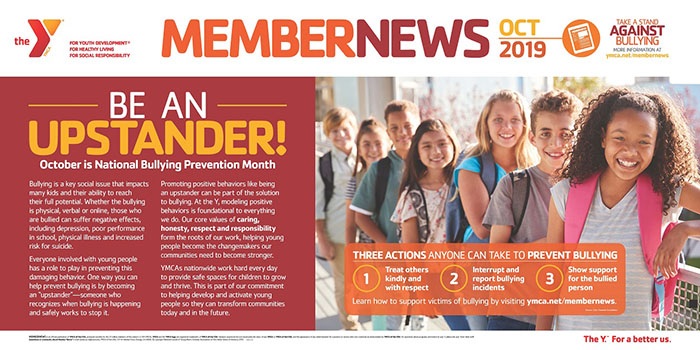October is National Bullying Awareness Month
Bullying is a key social issue that impacts many kids and their ability to reach their full potential. Whether the bullying is physical, verbal or online, those who are bullied can suffer negative effects, including depression, poor performance in school, physical illness and increased risk for suicide.
Everyone involved with young people has a role to play in preventing this damaging behavior. One way you can help prevent bullying is by becoming an “upstander” – someone who recognizes when bullying is happening and safely works to stop it.
Promoting positive behaviors like being an upstander can be art of the solution to bullying. At the Y, modeling positive behaviors is foundation to everything we do. Our core values of caring, honesty, respect and responsibility form the roots of our work, helping young people become the change makers our communities need to become stronger.
YMCAs nationwide work hard every day to provide safe spaces for children to grow and thrive. This is part of our commitment to helping develop and activate young people so they can transform communities today and in the future.
Three Actions Anyone Can Take to Prevent Bullying
1.) Treat Other Kindly & With Respect
2.) Interrupt & report Bullying Incidents
3.) Show support for the Bullied Person
Ways You Can Help Prevent Bullying
Any caring adult—parents, school staff, child care workers and others—can help prevent bullying incidents. This is what you can do, according to StopBullying.gov:
- Help kids understand bullying. Talk about what bullying is and how to stand up to it safely. Tell kids bullying is unacceptable. Make sure kids know how to get help.
- Keep the lines of communication open. Check in with kids often. Listen to them. Know their friends, ask about school, and understand their concerns.
- Encourage kids to do what they love. Special activities, interests, and hobbies can boost confidence, help kids make friends, and protect them from bullying behavior.
- Model how to treat others with kindness and respect.
The Tyler Clementi Foundation also has a number of ways individuals and entire communities can prevent bullying, such as the Million Upstander Movement Opens a new window and the #Day1 campaign Opens a new window.
Bullying Statistics
- 28% of U.S. students in grades 6–12 have experienced bullying.
- 20% of U.S. students in grades 9–12 have experienced bullying.
- 9% of students in grades 6–12 experienced cyberbullying.
- 15% of high school students (grades 9–12) were electronically bullied in the past year.
- 55.2% of LGBTQ students experienced cyberbullying.
- 30% of young people admit to bullying others in surveys.
- 70.6% of young people say they have seen bullying in their schools.
- 70.4% of school staff have seen bullying.
- 62% witnessed bullying two or more times in the last month and 41% witness bullying once a week or more.
Source: Tyler Clementi Foundation
For more statistics and research, go to StopBullying.gov



